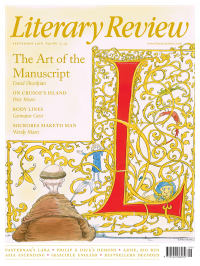Christopher Caldwell
More Money, More Problems
The Wealth of Humans: Work and Its Absence in the Twenty-First Century
By Ryan Avent
Allen Lane 278pp £25
When Uber recruits drivers, it tells them they can ‘make great money’ while setting their own schedules. When it recruits investors, it lays out plans for doing away with drivers altogether. The whole ‘innovation economy’ works this way. Workers help dig their own vocational graves. Free trade, mass immigration, just-in-time-inventorying, software entrepreneurship, Skype meetings: ‘innovation’ has so weakened the position of median workers that the most useful role many of them can play is just to shut up and collect their welfare cheques. Politics is split between those who believe the economy needs a major overhaul and those who think it simply needs a better public-relations strategy. The American Ryan Avent, an editor at The Economist, is closer to the latter camp than the former. But his view of the new economy’s shortcomings is unflinching. The Wealth of Humans does not offer the meditation on the end of work promised in the subtitle. It is, however, a balanced and sometimes bold presentation of the Establishment position on the important economic issues of today.
David Ricardo’s age-old fear that landowners would pocket the gains from economic advances is as justified in a world of fibre optics as it was in a world of barley, Avent believes. High-tech cities – New York, San Francisco, Boston, Seattle, London, Frankfurt – have overregulated their housing

Sign Up to our newsletter
Receive free articles, highlights from the archive, news, details of prizes, and much more.@Lit_Review
Follow Literary Review on Twitter
Twitter Feed
Under its longest-serving editor, Graydon Carter, Vanity Fair was that rare thing – a New York society magazine that published serious journalism.
@PeterPeteryork looks at what Carter got right.
Peter York - Deluxe Editions
Peter York: Deluxe Editions - When the Going Was Good: An Editor’s Adventures During the Last Golden Age of Magazines by Graydon Carter
literaryreview.co.uk
Henry James returned to America in 1904 with three objectives: to see his brother William, to deliver a series of lectures on Balzac, and to gather material for a pair of books about modern America.
Peter Rose follows James out west.
Peter Rose - The Restless Analyst
Peter Rose: The Restless Analyst - Henry James Comes Home: Rediscovering America in the Gilded Age by Peter Brooks...
literaryreview.co.uk
Vladimir Putin served his apprenticeship in the KGB toward the end of the Cold War, a period during which Western societies were infiltrated by so-called 'illegals'.
Piers Brendon examines how the culture of Soviet spycraft shaped his thinking.
Piers Brendon - Tinker, Tailor, Sleeper, Troll
Piers Brendon: Tinker, Tailor, Sleeper, Troll - The Illegals: Russia’s Most Audacious Spies and the Plot to Infiltrate the West by Shaun Walker
literaryreview.co.uk